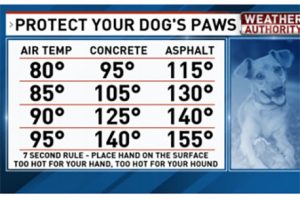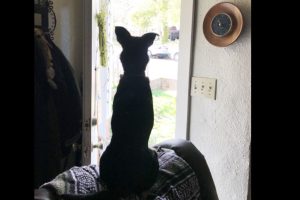Sonora, CA – As the temperatures hit triple digits, pets and livestock also need to be protected from the excessive heat.
Over the next several days, temps are forecast to remain over 100 degrees and possibly reaching 110. Calaveras County Animal Services offered some hot weather safety tips for pets from the American Society for the Prevention of Cruelty to Animals (ASPCA). One key is to keep outdoor animals hydrated, as in sweltering temperatures they can become dehydrated quickly. Also, make sure your pet has a shady place to get out of the sun’s rays.

Another ASPCA reminder, being so close to the ground, your dog’s body can heat up quickly, as the chart shows if the air temperature is 95 degrees, the asphalt is 155, leading to burned paws.
The number one rule, “Never leave your animals alone in a parked vehicle,” adds Dr. Louise Murray, Director of Medicine at the ASPCA’s Bergh Memorial Animal Hospital. “On a hot day, even with the windows open, a parked automobile can become a furnace in no time, and heatstroke can develop, which is potentially fatal.”
The ASPCA provided this list of symptoms that point to animals in heat distress:
Pets:
- excessive panting or difficulty breathing
- increased heart and respiratory rate
- drooling
- mild weakness
- seizures
- elevated body temperature of over 103 degrees.
Signs of Heat Stress in Livestock:
Stage 1: elevated breathing rate, restless, spend increased time standing.
Stage 2: elevated breathing rate, slight drooling, most animals are standing and restless.
Stage 3: elevated breathing rate, excessive drooling or foaming, most animals are standing and restless, animals may group together.
Stage 4: elevated breathing rate, open mouth breathing, possible drooling, most animals standing, animals may group together.
Stage 5: elevated breathing with pushing from the flanks, open mouth breathing with tongue protruding, possible drooling, most animals standing and restless.
Stage 6: open mouth breathing with tongue protruding, breathing is labored, and respiration rate may decrease, cattle push from flanks while breathing, head down, not necessarily drooling, individual animals may be isolated from the herd.
Of note, for owners of flat-faced pets, like pugs and Persian cats, that are more susceptible to heatstroke since they cannot pant as effectively, it is imperative that they remain indoors with air conditioning. That rule also applies to pets that are elderly, overweight, or with heart or lung di

